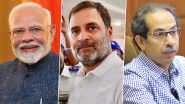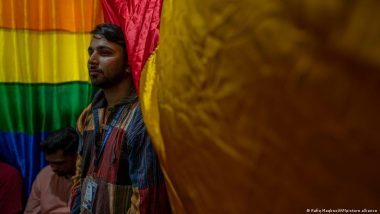India's Supreme Court has unanimously declined to legalize same-sex marriage, passing the responsibility back to Parliament. Where does this leave people in India who are in same-sex relationships?India's Supreme Court unanimously declined to legalize same-sex marriage on Tuesday, passing the responsibility back to Parliament.
Also Read | Pakistan’s Russian Energy Imports Test West’s Patience.
"The court cannot grant LGBTQ+ people the right to marry as that is a legislative exercise," it said.
Also Read | Israel-Palestine War: Israeli Airstrike in Central Gaza Kills One of Hamas' Top Militant Commanders.
The long-awaited judgment was a letdown for members and supporters of India's LGBTQ community, many of whom had gathered outside the court for the decision. Within hours, their dream had soured.
"It was a long shot and was always going to be tough for the court to get into this domain," activist Uday Raj Anand told DW. "But now we must work harder and see that the government appointed committee looks into granting LGBTQ+ people more rights."
Anand and his partner, Parth Mehrotra, are among the gay couples who petitioned the court to recognize same-sex marriages.
While Tuesday's decision was a disappointment, the New Delhi court, however, accepted an offer from the government to set up a special panel to explore granting social and legal benefits to same-sex couples.
What is the special panel for?
The committee will consider measures to address genuine concerns faced by cohabiting same-sex couples in their daily lives, such as joint banking, insurance, pension, property and admission of children to schools.
"The most disappointing thing is that there are no timelines. Being left to the mercy of a government committee with no specific dates is like an endless wait," gay-rights activist Sharif Rangnekar told DW.
India's Supreme Court recognized transgender people as a third gender in 2014, but Rangnekar pointed out that it took a long time for state governments across India to implement the court's ruling.
"We have seen how long it took state governments to implement the landmark judgment that recognizes transgenders to be the third gender amongst other guidelines to the government," added Rangnekar.
The top court had heard over 20 petitions from same-sex couples and activists in April and May during proceedings that were livestreamed, receiving widespread attention across India.
All petitioners sought the legal recognition of same-sex marriages, arguing that the right to marry a person of one's choice should extend to people in same-sex relationships.
Gay sex no longer taboo in India
India's highest court declared in 2018 that consensual intercourse between same-sex adults was no longer a crime in the South Asian country.
After the 2018 ruling, acceptance of gay couples increased, but LGBTQ rights advocates wanted same-sex marriages to be recognized in India, the absence of which leaves same-sex couples with the option of holding ceremonies to express their lifelong commitment to each another — but such celebrations are not legally recognized.
India's LGBTQ community has gained a strong voice that refuses to be silent in its efforts to gain equality. Tuesday's decision has made people who demand change more determined and driven.
"This judgment is a setback but we will not be cowed down. Elections are coming round the corner and we will be telling candidates and political parties about our issues," Harish Iyer, an equal rights activist told DW.
Vishwa Schoolwallah, an educationist, who runs an independent consultancy, and his partner, Vivek Patel, who have now been "married" now for seven years had hoped for a positive ruling but were prepared for the worst.
"There will always be that void which will not be filled. But I don't mind waiting for it. It will all come in good time," Patel told DW.
Recognizing same-sex marriage would have made India only the third place in Asia to legalize the registration of such unions.
Taiwan became the first jurisdiction in Asia to recognize same-sex marriage in May. Two months later, Nepal's Supreme Court issued an interim order enabling the registration of same-sex marriages. It's still not clear when the court will make its final decision on the case.
"I am not disappointed because I know that we tried," Schoolwallah told DW regarding the decision in India. "If it does not happen this time, I am okay with that ... if we continue the fight."
Many people like Vishwa and Vivek hope that ceremonies like the one they held will someday count as legal weddings.
Edited by Keith Walker
(The above story first appeared on LatestLY on Oct 17, 2023 08:30 PM IST. For more news and updates on politics, world, sports, entertainment and lifestyle, log on to our website latestly.com).













 Quickly
Quickly




















